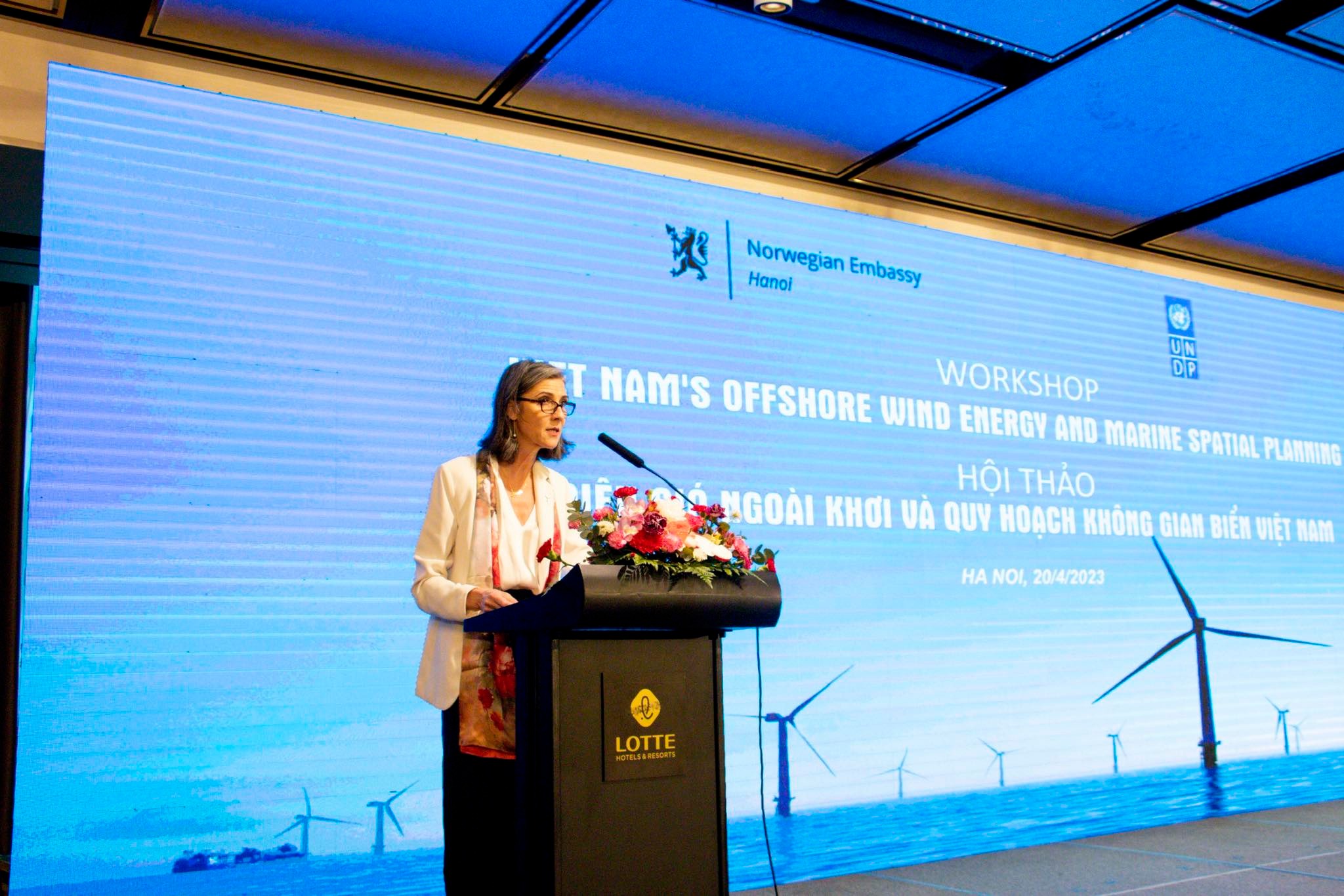Opening Remarks by Ms. Ramla Khalidi, UNDP Viet Nam Resident Representative
Workshop on “Viet Nam’s Offshore Wind Energy and Marine Spatial Planning”
April 20, 2023

- Mr. Ta Dinh Thi, Deputy Chair of Science, Technology and Environment Committee of the National Assembly;
- Ms. Hilde Solbakken, Norwegian Ambassador to Viet Nam;
- Ambassadors, Counsellors and Senior Representatives of government departments, development partners, enterprises and organizations;
- Distinguished guests, ladies and gentlemen;
Good afternoon.
I join Mr. Thi and Ambassador Solbakken in welcoming you to this important event on marine spatial planning and offshore wind energy; timely and strategic topics in the context of increasing attention on sustainable ocean economy and the climate crisis.
As highlighted by Mr. Thi, recognizing the importance and potential of the ocean, the Party has issued two strategic policies: Resolution No. 36 in 2018 on Viet Nam’s Marine Economy and Resolution No. 55 in 2020 on Orientation of the National Energy Development Strategy . These resolutions provide a framework to ensure energy and food security through enhanced ocean-based economic sectors, including fisheries, tourism, transportation and wind power.
Viet Nam’s first ocean economy report, titled “Blue Economy Scenarios,” was launched in May 2022 by UNDP and MONRE’s Viet Nam Administration of Seas and Islands (VASI). It demonstrated that by applying blue economy scenarios, GDP of Viet Nam’s marine economic sectors will be 34% (or 23.5 billion USD) higher; and GNI per capita in these sectors almost 78% (or 7,100 USD) higher compared to the business-as-usual scenario in 2030.
The report also highlighted that accelerating marine spatial planning is essential for unlocking the tremendous potential of offshore wind power development for Viet Nam, contributing to the achievement of the Sustainable Development Goals and climate change commitments made at COP26, including achieving net zero emissions by 2050.
Ladies and gentlemen,
The Marine Spatial Plan is expected to provide overarching direction and to bring concerned stakeholders together and ensure coordinated actions and synergies among economic sectors. For example, the MSP will help identify and define the sites where renewable energy projects can be developed without adversely affecting other marine activities, such as transport, fishing, and ecosystem and biodiversity conservation.
We recognize that there is no single model for marine spatial planning. Every country must determine its own model, based on strategic priorities, available data and resources; as well as capacities and experience. As Viet Nam is at a relatively early stage in the process of formulating both its coastal zone planning and sustainable management of resources document, and its marine spatial planning document, today’s workshop gains even more relevance as a forum to promote sharing of experiences and good practices from other countries including Norway and the UK.
Similarly, pre-preparation and pre-development of offshore wind energy sites and deployment of offshore wind power are also new and challenging for Viet Nam. With its strong commitment to achieve net-zero emissions by 2050, as well as the offshore wind power targets of 7GW by 2030, Viet Nam will need to take an innovative approach to accelerate the preparation and development of offshore wind. Fortunately, Viet Nam can benefit from the experiences of others including the UK, the US, Denmark, Germany and Norway, who have successfully developed large offshore wind farms, or have recently undertaken auctions and provided licenses for the development of wind power farms.
On this occasion, I would like to share five reflections for your consideration:
- First, marine spatial planning should be seen as a continuous process rather than a single fixed product. As such, we must not seek to develop a single, perfect and all-encompassing document at this stage. Instead, the Government should focus on the areas where we have the best knowledge and information, and where the Marine Spatial Plan provides an overall direction and framework, so that other development work can commence. The plan can then be regularly updated as new data becomes available.
- Second, it is essential that the development and approval of the Marine Spatial Plan, as well as the determination of the sites for offshore wind power development, is done in an open, consultative and inclusive manner. Engagement of all stakeholders, especially local communities will be important, to ensure equitable sharing of benefits and the protection of vulnerable groups.
- Third, it is strongly recommended that the Government invest in basic survey, including actual windspeed measurements at one to two sites, and seabed morphology and geology assessments. Within the framework of the Just Energy Transition Partnership (JETP), Viet Nam can work with JETP members to identify financing for these initial activities.
- Fourth, the Government of Viet Nam may also consider a “fast-track” mechanism, which was recently introduced by the UK, the US and Ireland, to experiment the development of the first one or two gigawatt, while finalizing planning and preparation.
- And Finally, an innovative and progressive legal framework, enhanced governance, grid connection assessment, and a direct power purchase mechanism meeting international standards, are urgently needed to enable the deployment of offshore wind to meet ambitious targets in the draft Power Development Plan VIII (PDP8), not to mention the electricity needs for development and the potential export to Singapore and other ASEAN countries in the future.
Ladies and Gentlemen,
I would like to express my great appreciation to the Norwegian Embassy for the generous financial support and fruitful cooperation in providing support to Viet Nam in these important efforts on marine spatial planning and offshore wind power.
I am also very grateful for the support and cooperation from the Committee of Science, Technology and Environment of the National Assembly, VASI, MONRE, and other development partners, including the World Bank, Denmark, the EU, and GIZ, among others, for great collaboration and support.
Thank you for joining us and I look forward to fruitful discussion that will help advance our collaboration for the further sustainable development of the blue ocean economy in Viet Nam.
Xin Cam on!

 Locations
Locations



